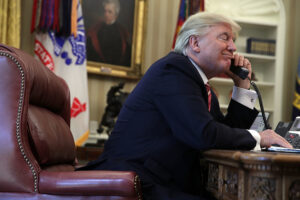
(Photo by Alex Wong/Getty Images)
Today the US Court of Appeals for the DC Circuit pared back but still affirmed Judge Tanya Chutkan’s October order banning Donald Trump from attacking witnesses in his election interference case. The gag order lives to fight another day.
Two months ago, the trial judge imposed a limited order barring Trump — well, all parties, LOL — from statements “targeting” witnesses, court staff, and attorneys in the case. Trump’s lawyer John Sauer insisted that his client had an absolute First Amendment right to attack potential witnesses Mike Pence, Bill Barr, and Gen. Mark Milley, and even Special Counsel Jack Smith’s wife. In fact his maximalist position would have essentially voided all gag orders, since he claimed that the Brandenberg incitement standard applied. As the District and Circuit courts both noted, this would mean that the only gag-able speech would be statements which are actually criminal — and that cannot possibly be the standard.

How LexisNexis CourtLink And Lexis Snapshot Deliver Business Wins
These tools demonstrate that information is power.
“[H]is proposed rule gets constitutional precedent wrong,” Judge Patricia Millet wrote for the unanimous panel, which included Judges Cornelia Pillard and Brad Garcia. They affirmed Judge Chutkan’s order, insofar as it relies on Gentile v. State Bar of Nevada,, 501 U.S. 1030 (1991), which set bar for restriction on speech which presents “serious risk of prejudice to an ongoing judicial proceeding.”
Indeed, as at the oral argument, the panel more or less rubbished Trump’s arguments in their entirety.
“The record shows that Mr. Trump has repeatedly attacked those involved in this case through threatening public statements, as well as messaging daggered at likely witnesses and their testimony,” the judges agreed, noting that Trump has a long history of targeting his political enemies, after which they face a torrent of threats and abuse, from which it’s safe to infer that he intends the result.
And no, for the love of God, riling your supporters up to harass someone is NOT a “classic heckler’s veto,” as Sauer and John Lauro have both argued repeatedly.

Take Control Of Your Firm’s Finances With Tools Built For Success
Position your firm for long-term growth with better financial visibility and control. Learn how to track performance, manage spending, and plan strategically—download the full e-book now.
That doctrine prohibits restraining speech on the grounds that it “might offend a hostile mob” hearing the message, or because its audience might express “hostility to” the message. The harm the district court identified here was not that some members of the public who oppose Mr. Trump’s message might react violently and try to shut down his speech. The concern was instead “how predictable” it has become, that some (but certainly not all, or even many) of Mr. Trump’s followers will act minaciously in response to his words. [Citations omitted.]
The appeals court was similarly unimpressed with Trump’s claim that it’s an unlawful prior restraint to impose a gag order in the absence of evidence that a witness was actually intimidated or without detailing specific threats against court staff on the public docket.
“No one is entitled to one free bite at derailing witness testimony or impeding the trial court’s ability to function,” the panel scoffed, noting that Judge Chutkan has received at least one racist death threat which led to an indictment.
But, the ban on “targeting” witnesses was modified to a ban on “public statements about known or reasonably foreseeable witnesses concerning their potential participation in the investigation or in this criminal proceeding.” So, for instance, Trump can resume calling Bill Barr a “loser,” he just can’t say “he’s a loser who shouldn’t testify.” As the court noted, the trial court order was based on a need to prevent witness intimidation, not to protect the venire by preserving the credibility of witnesses, and so generalized criticism of potential witnesses can’t be barred. (It should be noted that the appellate court made this argument more or less sua sponte, since Trump’s lawyers were far too busy howling about the supposedly gross assault on the First Amendment to advocate for some kind of rational compromise.)
Similarly, the trial court’s ban on criticism of Special Counsel Jack Smith himself is out: “As a high-ranking government official who exercises ultimate control over the conduct of this prosecution, the Special Counsel is no more entitled to protection from lawful public criticism than is the institution he represents.”
Trump is taking it with his usual grace and aplomb:
An Appeals Court has just largely upheld the Gag Order against me in the ridiculous J6 Case, where the Unselect January 6th Committee deleted and destroyed almost all Documents and Evidence, saying that I can be barred from talking and, in effect, telling the truth. In other words, people can speak violently and viciously against me, or attack me in any form, but I am not allowed to respond, in kind. What is becoming of our First Amendment, what is becoming of our Country? We will appeal this decision!
Weak! Clearly he hasn’t read it and is just making a token whine in deference to the base. But it’ll probably raise a few hundred thousand dollars, so … mission accomplished.
US v. Trump [District Docket via Court Listener]
US v. Trump [Circuit Docket via Court Listener]
Liz Dye lives in Baltimore where she writes about law and politics and appears on the Opening Arguments podcast.